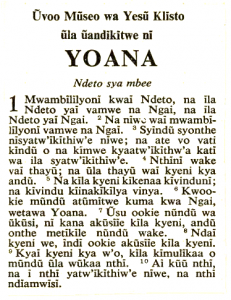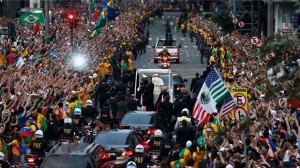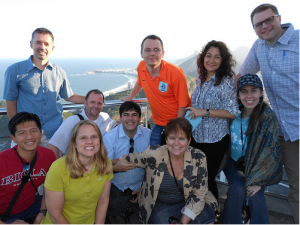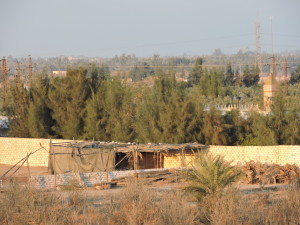
The wall on the back part of the property, and a mosque just beyond it.
The accompanying picture is of a wall on the back portion of the property of Anafora, a retreat center in Egypt run by the Coptic Church. If you look closely, you will notice a building beyond the wall. That’s a mosque. There are actually three mosques bordering the property of this facility, which is located out in a farming area south of Cairo. Therein lies a story. Or an observation, at least.
In early January, my wife and I returned from a week in Egypt, where we visited my daughter Brenna, who is working for a year at Anafora. Actually, Anafora is more than a retreat center. It is also a monastery/farm/conference center/school/commune/counseling center/biblical exhibit/oasis kind of thing. You know.
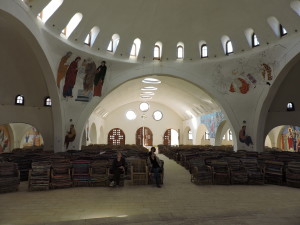
Interior of the Coptic church at Anafora.
Anyway, the church purchased the land about thirty years ago and began building on it about fifteen years ago. Among the structures they built, the Coptic Christians, unsurprisingly, erected a church. After that happened, three mosques were built at different places around the edges of the property. A couple of Coptic Christians told me that whenever a church is built in Egypt, Muslims will build a mosque as close to it as they can. One Coptic Christian laughed a bit in explaining this, saying, “They like to keep us company.”
As Brenna gave us a tour of the Anafora property (which I estimate to cover about 85 acres, a good size for a monastery/farm/conference center/school/commune/ counseling center/biblical exhibit/oasis kind of thing), we walked along the back edge and looked at the mosque beyond the wall. That’s when I noticed a speaker, one speaker, up high on the tower and pointed directly at the Anafora property.
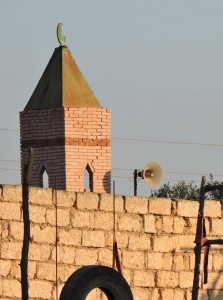
Keeping the Christians at the retreat center company.
And the purpose of the speaker? The Islamic call to prayer. Five times a day, mosques in Egypt broadcast a chant in Egypt that is the call to prayer. You hear it everywhere in Cairo. You also hear it at the Christian retreat center of Anafora, as I did at 6 a.m. when I was turning over in my sleep. (Many Muslims get up earlier than I do, apparently). It is not even clear that anyone attends the call to prayer at the mosque at the back of the Anafora property, which is out in the middle of a bunch of irrigated fields. One story, unverified but probably true, is that somebody investigated the mosque during the call to prayer. They not only did not find any Muslims engaged in prayer, but did not even find a muezzin there singing the prayer. The prayer floating out over Anafora seemed to be just a recording.
I’m not sure, exactly, what motivates the Egyptian Muslims to aim that speaker right into the Christian retreat center. It might stem from a desire to harass and intimidate. It might be a desire to constantly remind the Christians that Egypt is an Islamic nation. It might stem from an anxiety that Christians pose a threat to an Islamic society. It might even be a pretty bad attempt at evangelism. And it might be some sort of combination of these things.
Whatever it is, I would not call it a good thing, even though I wouldn’t put it in the category of religious persecution. Harassment, maybe.
Here is my main observation: it is at this point that we Christians (and other non-Muslims) are tempted to shake our heads at this behavior and file the situation away in our mind as another example of the problems with Islam. I know I am tempted that way.
I use the word “tempted” because there is a danger here that sin would distort our thinking. I’m not saying these particular Muslims are innocent of bad behavior. I’m saying that the flip side of the “problem with Islam” way of thinking is that it subconsciously and conveniently assumes that a “Christian” or “secular” society (take your pick) does not have the same problem. In other words, we are tempted, even in an unconscious way, to think, “I’m sure glad we aren’t that way.”
A colleague of mine, Steve Moroney, identifies this sort of things as a “self-serving comparison.” Moroney published an interesting study which drew upon social psychology and theology to explain how sin affects our thinking. Simply put, when we are considering a trait that is socially desirable, most of us report that we are better than average.
Of course, it is impossible for a majority of people to be better than average. (Do the math). But consider that most Americans consider themselves to be safer drivers than other Americans. Most business executives consider themselves to be more ethical than the average business executive. 78% of Australians consider themselves to be better parents than average. When high school students were asked to rate how well they got along with others, all rated themselves as at least average, 60% considered themselves to be in the top tenth of this trait and 25% thought they were in the top 1% of those with the ability to get along with others.
Ah, those funny business executives, Australians, and high school students just can’t see themselves as clearly as, say, professors. After all, it is our job as professors is to think clearly. Right? Well, 88% of all professors think their teaching is above average. 10% rate their teaching as average. Only 2% consider themselves to be below average, which just goes to show you that just about every college class produces great teaching that is well above average.
Of course, Jesus understood all of this two thousand years ago, when he asked, “Why do you see the speck in your neighbor’s eye, but do not notice the log in your own eye?”
A question to ask, then, is how do we treat Muslims in the United States? Do we have our own version of speakers blaring into their retreat centers which, I should say again, is a very bad method of evangelism? Maybe we do a better job, but we should not assume we do. Instead of assuming that obnoxious or bad behavior is a “problem with Islam,” we should probably ask different questions, individually and as a society, as to whether we might have blind spots in this area and how we would find out if we did. We need to get better at recognizing our own blind spots.
A friend of mine told me that he once heard a lady walking out of his church one Sunday morning saying, “I’m sure glad we Quakers don’t stereotype other people like the Baptists do.”
And I’m sure glad I’m getting better than that Quaker lady at recognizing my own blind spots.
Uh….oops.








